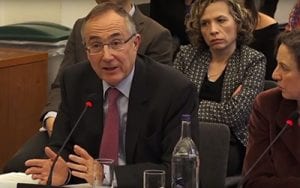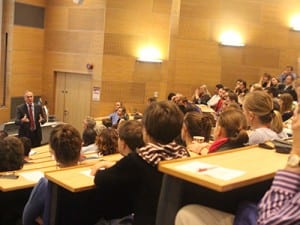Beyond the headlines and hyperbole: Young people and Brexit Britain
By ucypndo, on 6 June 2017
Written by Natasha Downes, Media Relations Manager, UCL
Young people have a complex relationship with politics, and they are often described as disengaged and apathetic.
With Brexit expected to hit young people the hardest, what would the outcome of the referendum mean for them? How would it affect their attitudes, aspirations and sense of identity?
These are the questions Dr Avril Keating (UCL Institute of Education) is seeking to answer through her research project, ‘Being young in Brexit Britain’. On Monday 5 June, Dr Keating presented the emerging results of her research in a talk entitled ‘Growing up Global’ as part of the UCL Festival of Culture.
“Most young people voted Remain, but what we wanted to do was look beyond the headlines and hyperbole, to find out if those results would inspire a youth revolution”, said Dr Keating.
In fact, what the emerging results of Dr Keating’s research has so far highlighted is that there are many diverse reasons why young people voted Remain, and that both the In and Out camps had two important things in common: a sense of uncertainty and a lack of information. As a Millennial myself, I can really relate to this feeling of uncertainty.
An uncertain future
The results so far represent London and the South East, but they have covered a wide demographic of young people including elite students and young people from disadvantaged backgrounds. While the vast majority of 15-29 year olds voted Remain, perhaps unsurprisingly, few were enthusiastic Europhiles.
Instead, many young people voted Remain because they thought it was in their best interests, while others voted Remain by default. These young Remainers-by-default felt ill-informed to make their own decision, and as their friends and family were voting this way, it seemed like the safe option to maintain the status quo. When young Leavers were asked about their decision, they also had varied reasons for doing so, including protecting Britain’s sovereignty, addressing immigration and the view that the EU is a costly burden to the UK.
One year on, the Remainers are largely resigned, albeit anxious, while the Leavers are a split between the nervous and the optimistic. But there is a consensus among both camps of having low knowledge about the specifics, and feeling uncertain about what all of this really means for the future of Britain.
 Close
Close




 In reaction to the political confusion that has occurred following the UK’s decision to leave the European Union, a Q&A session was arranged to provide some clarity about what Brexit means for UCL’s staff and students.
In reaction to the political confusion that has occurred following the UK’s decision to leave the European Union, a Q&A session was arranged to provide some clarity about what Brexit means for UCL’s staff and students.